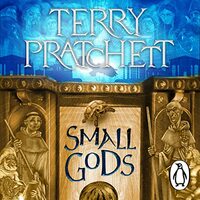You need to sign in or sign up before continuing.
Take a photo of a barcode or cover
adventurous
funny
hopeful
inspiring
lighthearted
reflective
medium-paced
Plot or Character Driven:
Character
Strong character development:
Yes
Loveable characters:
Complicated
Diverse cast of characters:
Yes
Flaws of characters a main focus:
Yes
inspiring
reflective
medium-paced
funny
reflective
medium-paced
Plot or Character Driven:
Character
Strong character development:
Yes
Loveable characters:
Complicated
Diverse cast of characters:
Yes
Flaws of characters a main focus:
Yes
challenging
funny
inspiring
lighthearted
medium-paced
Plot or Character Driven:
A mix
Strong character development:
Yes
Loveable characters:
Yes
Diverse cast of characters:
Complicated
Standalone book in the series, which was refreshing! Doesn't follow the wizards or the witches or the guards. Same wit as always, great footnote comedy!
“What have I always believed? That on the whole, and by and large, if a man lived properly, not according to what any priests said, but according to what seemed decent and honest inside, then it would, at the end, more or less, turn out all right.”
― Terry Pratchett, Small Gods
Terry Pratchett's Discworld is the cozy family blanket of fantasy series–I don't find myself wrapped up in it all the time, but it's always a delight to return to. Visiting the standalone that's most often recommended to me– Small Gods –my opinion of Pratchet's work only grows grander.
Small Gods tells the story of the naive and faithful Brother Brutha and his journey with his not-so-great god Om, descended to Discworld in the form of a turtle. Caught up in religious machinations and the ongoing conflict between nations, Brutha must return his god to his proper form and keep his faith along the way.
As with all works by Terry Pratchett, the plot acts as the framework to build the humour, social commentary, and characters around. Unlike some of the early Discworld novels–this one is lucky number 13 in the scantly connected series–Pratchett isn't satirizing a specific work in the Western canon. Without needing to follow a story that's been already told, the plot of Small Gods –though simple–bounds along in interesting directions and at a remarkably readable pace. Even as standalone Discworld novels go, this one is incredibly new reader-friendly. As long as you're willing to go along with Brutha on his pilgrimage, there's little else you need to know before you begin. In a world replete with tightly interwoven fantasy epics, which sometimes need an encyclopedia of their lore to keep up with, Pratchett's ability to create a world that can be entered at any point, but still holds additional surprises for long-time readers, can't be matched.
Humour is one of the thorniest aspects of any work to comment on or critique–I don't know how comedy reviewers do it. All art is subjective on some level, but the things that make us laugh?–well, that's another challenge altogether. On some days, it's a simple knock-knock joke or an unsuspecting dumb bit of humour on the internet. On others, you might be sitting down to watch a carefully constructed stand-up special that'll leave you laughing and in awe. Humour is a core element of human experience that connects us but is also an intensely personal experience that can shift and change with each of us as time marches on toward its inevitable denouement. This is all to say I thought Small Gods was quite funny quite often, and I chuckled a good few times while reading.
Aside from the humour, another aspect of Pratchett's Discworld series is the deftly made social commentary and satire throughout. The key reason why Pratchett's musings hold up so well over time–keep in mind this novel was written in 1992–is the humanity and care that he puts in his work. Often when you hear a book described as a satire of Western religions, it's fair to expect the novel to beat you over the head with a Christ-adjacent figure and big ol' bearded man in the sky. Sir Terry Pratchett has a defter touch that isn't any less critical or biting, but he examines the universal truths behind why people believe, how others can abuse that faith, and how folks turn to religion despite the conflicts, controversies and hypocrisies found in pretty much every religious institution. It never feels like Pratchett is taking the easy joke or playing to the cheap seats with his humour. With all the care he puts into his critiques, it'd be difficult for someone of the opposite opinion to brush off his thoughts as some sort of bad-faith–sorry for that–argument.
“Belief, he says. Belief shifts. People start out believing in the god and end up believing in the structure.”
No matter if you're a long-time Discworld acolyte or a novice, Small Gods is a brief worthwhile romp through the world that Terry Pratchett imbued with so much character and life.
― Terry Pratchett, Small Gods
Terry Pratchett's Discworld is the cozy family blanket of fantasy series–I don't find myself wrapped up in it all the time, but it's always a delight to return to. Visiting the standalone that's most often recommended to me– Small Gods –my opinion of Pratchet's work only grows grander.
Small Gods tells the story of the naive and faithful Brother Brutha and his journey with his not-so-great god Om, descended to Discworld in the form of a turtle. Caught up in religious machinations and the ongoing conflict between nations, Brutha must return his god to his proper form and keep his faith along the way.
As with all works by Terry Pratchett, the plot acts as the framework to build the humour, social commentary, and characters around. Unlike some of the early Discworld novels–this one is lucky number 13 in the scantly connected series–Pratchett isn't satirizing a specific work in the Western canon. Without needing to follow a story that's been already told, the plot of Small Gods –though simple–bounds along in interesting directions and at a remarkably readable pace. Even as standalone Discworld novels go, this one is incredibly new reader-friendly. As long as you're willing to go along with Brutha on his pilgrimage, there's little else you need to know before you begin. In a world replete with tightly interwoven fantasy epics, which sometimes need an encyclopedia of their lore to keep up with, Pratchett's ability to create a world that can be entered at any point, but still holds additional surprises for long-time readers, can't be matched.
Humour is one of the thorniest aspects of any work to comment on or critique–I don't know how comedy reviewers do it. All art is subjective on some level, but the things that make us laugh?–well, that's another challenge altogether. On some days, it's a simple knock-knock joke or an unsuspecting dumb bit of humour on the internet. On others, you might be sitting down to watch a carefully constructed stand-up special that'll leave you laughing and in awe. Humour is a core element of human experience that connects us but is also an intensely personal experience that can shift and change with each of us as time marches on toward its inevitable denouement. This is all to say I thought Small Gods was quite funny quite often, and I chuckled a good few times while reading.
Aside from the humour, another aspect of Pratchett's Discworld series is the deftly made social commentary and satire throughout. The key reason why Pratchett's musings hold up so well over time–keep in mind this novel was written in 1992–is the humanity and care that he puts in his work. Often when you hear a book described as a satire of Western religions, it's fair to expect the novel to beat you over the head with a Christ-adjacent figure and big ol' bearded man in the sky. Sir Terry Pratchett has a defter touch that isn't any less critical or biting, but he examines the universal truths behind why people believe, how others can abuse that faith, and how folks turn to religion despite the conflicts, controversies and hypocrisies found in pretty much every religious institution. It never feels like Pratchett is taking the easy joke or playing to the cheap seats with his humour. With all the care he puts into his critiques, it'd be difficult for someone of the opposite opinion to brush off his thoughts as some sort of bad-faith–sorry for that–argument.
“Belief, he says. Belief shifts. People start out believing in the god and end up believing in the structure.”
No matter if you're a long-time Discworld acolyte or a novice, Small Gods is a brief worthwhile romp through the world that Terry Pratchett imbued with so much character and life.
3.75 stars.
Me: Are you the Great God Om?
Joe, coworker and only turtle in the library: *slowly closes one eye*
Me: You minx.
This book gets 5/5 stars for humor. My main problem was the ADHD flow. It was fun at times but for the most part I found it flustering. However, I'll definitely be reading more Discworld books in the future.
Me: Are you the Great God Om?
Joe, coworker and only turtle in the library: *slowly closes one eye*
Me: You minx.
This book gets 5/5 stars for humor. My main problem was the ADHD flow. It was fun at times but for the most part I found it flustering. However, I'll definitely be reading more Discworld books in the future.




